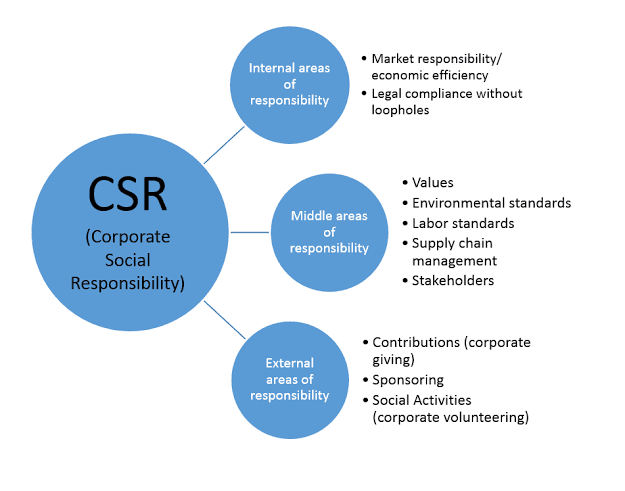“Businesses, like their agents and officers, must be accountable to stakeholders and the customers. They should keep their customers’ interests in mind and not only focus on revenues, while taking environmental and social aspects into consideration while governing activities such as marketing and advertising”– Lauren Bradshaw, an essay writer from CustomWritings.com
The importance of sustainable development is a pressing issue that needs to be considered by every citizen. Businesses that consider CSR as a key component of their business plan help communities and the environment by sharing the benefits, both financial and sociological, with society.
What is CSR?
Corporate social responsibility is a business’s commitment to the triple bottom line: a company’s social responsibility, its environmental impact, and the impact of its operations on society. By taking steps to reduce their carbon footprints and support causes that matter to their customers, businesses can show that they care about more than just the bottom line.
It can also be seen as a company’s ability to sustain a business without endangering society or the environment in which it operates, or compromising its profitability.
While it is no longer enough for businesses to merely consider corporate social responsibility as a corporate ethic or internal organizational policy, many companies around the world — and in the United States — have developed their policies to support disadvantaged communities and meet sustainability goals.
Why Should a Company Implement CSR?
Companies have been making a strong commitment to Corporate Social Responsibility (CSR), as they believe it will benefit their brand’s image. Many businesses now realize that as consumers become more educated about the impact of social and environmental issues on their lives, they are eager to embrace businesses that are committed to corporate social responsibility. And for many business leaders, corporate social responsibility is also an important factor in how they choose to run their company.
What Is the Impact of CSR on Education?
Companies are increasingly aware of the importance of corporate social responsibility (CSR). We can see this in the increasing number of companies that implement sustainability strategies, reduce their carbon footprint, and divest from unethical business partners. These efforts often include addressing environmental, social, and governance (ESG) risks proactively through due diligence processes, engaging stakeholders in transparent dialogues, and implementing programs to improve employee well-being.
How Does CSR Work?

- Internal Area of Responsibility
The internal area of responsibility includes all internal processes that affect the corporate strategy itself. The internal area of responsibility requires commitment from company leaders. In addition to the external environment, this must be taken into account to make important decisions, such as partnering with a new company or acquiring a competitor, consolidating industries to eliminate possible monopolies, and planning a realistic and appropriate growth path with a focus on health and sustainability.
- Middle Area of Responsibility
The middle area of responsibility includes everything a company can directly control. For example, it’s related to environmental pollution and brands’ working conditions.
- External Area of Responsibility
As a socially responsible company, you do more than what’s in your own best interests. You go above and beyond the bottom line in the name of corporate citizenship by helping your community in ways that don’t directly affect your organization. The result is better relationships with customers, investors, employees, and the surrounding community.
How Can CSR be Presented in the Education Field?
Every year, millions of children are enrolled in government schools around the world. But only a small percentage of them complete their education successfully. The reason? The education provided in most government and government-aided schools is subpar. The primary reason for girls dropping out of school is that they are expected to work at home. Their families don’t allow them to continue attending school because their productivity at home is higher. The other contributing factors are Poverty, Unemployment, and Discrimination based on Caste, Gender, Race, and other social barriers.
Companies can bring about a lot of value to society by playing a leading role in social innovation. Social entrepreneurship initiatives require a lot of administrative and organizational knowledge, which corporations have a firm grasp over.
These companies know what it takes to make a project work from start to finish, and thus can innovatively apply their management expertise for the greater good. The education system in underprivileged areas is consistently underfunded.
This leads to a wide range of problems, from increased class sizes and lowered standards too low graduation rates and high failure rates. Financial support alone will not alleviate these problems — companies must work closely with educators and parents to ensure that their investment truly benefits the local community.
There’s a lot to consider in the education sector. While it is important to provide students with an in-depth understanding of certain principles and concepts, it is equally vital to ensure that your business meets all the right criteria in delivering high-quality educational products and services — especially in terms of technology maintenance and service continuity.
Volunteering can be an excellent way to engage employees and build relationships with others in the community. Start by providing your team with a list of local charities and nonprofits that align with your organization’s values — you’ll not only build stronger bonds within your company but also help out those in need. Philanthropy is a critical component of business that often goes overlooked.
While some companies choose to donate funds, others choose to take an active role in philanthropy by donating products and services, volunteering their time, and more. This platform will allow for a unique opportunity for corporations to connect with schools and individuals who benefit from quality products and services, as well as the expertise that businesses have accumulated over the years.
Pitfalls of lack of Corporate Social Responsibility in Education
- Costs
The first way that costs impact an organization that incorporates CSR into its operations is that those organizations frequently need to incur special costs to implement those changes. For example, if a company is usually unaccustomed to donating a portion of its profits to charity, it may need to hire additional employees to manage those donations and may need to take on additional warehouse space to store the additional inventory it donates. Those kinds of extra expenditures can negatively affect a business’s bottom line.
- Clashing of business objectives
Businesses are driven by profits. Without them, there would be no growth or improvements in the business. And it’s possible to grow your profits with targeted marketing that converts website visitors into leads and leads into sales.
A company’s social responsibility endeavors are an opportunity to strengthen its brand. By partnering with charitable organizations and engaging in helpful community development, businesses can select projects that resonate with their mission and values. And consumers will respond to such good deeds with loyalty and support.




















